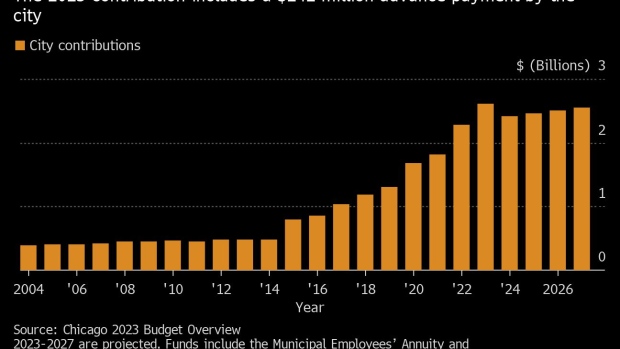Oct 3, 2022
Chicago Mayor Plans Extra Pension Payments in $16.4 Billion Budget
, Bloomberg News

(Bloomberg) -- Chicago Mayor Lori Lightfoot is planning to advance payments to the city’s beleaguered pension funds as part of her $16.4 billion proposed budget for next year, which also boosts funding for abortion services and for the police.
Lightfoot, who is running for reelection this year, branded the proposal as a “stability budget” – one that maintains past programming under the Chicago Recovery Plan, doesn’t levy new taxes on homeowners and includes an additional $242 million in early pension payments after the city increased its annual contributions by $1 billion in the past three years.
Chicago’s severely underfunded pensions have dragged down the city’s credit for years as officials work to close persistent funding gaps. The Windy City paid required contributions to all four pension funds for the first time ever in 2022, and plans to pay $2.6 billion in 2023, an increase of 15% from a year earlier.
“Our pension obligations are real,” Lightfoot said in an address to city council members Monday. “Not a nicety, but a necessity for us to meet because essential workers who kept us safe and provided City services during the pandemic and more are depending on us to keep our historic promises to them.”
The early pension payments are on top of regular contributions and the first $40 million check from Bally’s for the new Chicago casino, which will support retiree benefits for police and firefighters.
Lightfoot is planning to increase pension payments even after she abandoned a proposal to hike property taxes by 2.5% that would have generated $42.7 million entirely for pensions. Both those moves are possible because revenues for 2023 are now expected to come in $260 million above an August projection.
In 2023, Chicago is looking to close a $128 million projected deficit, one of the “lowest in recent memory,” Lightfoot said. The overall size of Lightfoot’s proposed 2023 budget is 1.3% smaller than the amount set aside for 2022, when the Windy City faced a $733 million hole.
New Spending
Lightfoot’s broader budget proposal includes new spending of $3.1 million for reproductive health care, an additional $10 million for homelessness and support services and another $13.5 million for public safety – bringing the total public safety spending to 45.3% of the corporate fund, Chicago’s main fund for city operations.
The mayor has been under pressure by rising crime and corporate departures. Illinois’s richest man, Ken Griffin, is moving his Citadel hedge fund to Miami and Boeing Co. said it would pull its headquarters from the city.
Still, Alphabet Inc.’s Google recently announced it was buying a downtown building the size of a city block, which Lightfoot said will add at least 3,000 jobs.
“Google’s announcement that it would bring 3,000 to 5,000 new jobs to a redesigned Thompson Center is no fluke,” she said.
Related: McDonald’s to Move Jobs to Chicago But Voices Concern on Crime
Under her plan, the police department’s budget would increase to $1.94 billion from $1.88 billion this year, according to the budget overview. Overall, the mayor is proposing more than $100 million in investments supporting violence reduction, including programs addressing education, job opportunities, trauma and community disinvestment as the root causes of violence. The police budget is likely to be a sticking point in this year’s negotiations as the department works to fill vacancies.
Lightfoot’s spending plan for reproductive health includes money for abortion access and education, and builds upon $500,000 already allocated by the department of public health to two reproductive health organizations.
Related: Chicago Offers Sanctuary for Abortions, Gender-Affirming Care
And while Lightfoot touted her commitment to supporting people experiencing homelessness – “over $200 million in investments to support services,” according to the budget overview – advocates are pushing the city to do more. Ahead of the mayor’s budget address, organizers rallied in the lobby of City Hall with tents to represent the estimated 65,000 Chicagoans experiencing homelessness.
The group is pushing for the city council to implement a higher real estate transfer tax on sales of properties valued at over $1 million -- funds the group says could be used to construct desperately needed housing.
“Everyone has a right to housing and everybody should be treated fairly,” said April Harris, a grassroots leader at the Chicago Coalition for the Homeless.
Pension Losses
Chicago investors and bond rating analysts have repeatedly touted the city’s pension funding as crucial to its financial stability. The upfront pension payments will “prevent asset liquidation in the current down market,” according to the budget overview. They also come amid estimated losses of 12% as of Aug. 31, which represents more than $100 million of the city’s annual required increase.
“This pension advance will prevent pension funds, as they do now, from having to sell assets every month” to meet their obligations, Lightfoot said, adding that early payments would constitute a “new pension fund policy.”
Under that policy, Chicago would make a pension contribution large enough to prevent liabilities from growing because of accrued interest or administrative costs -- rather than just the amount required by Illinois statute, the city’s Chief Financial Officer Jennie Bennett said on an press call on Monday.
“It’s a significant statement of strength in the finances of the city, which I hope that the ratings agencies would recognize,” Bennett said.
(Updates with Chicago CFO quote.)
©2022 Bloomberg L.P.





